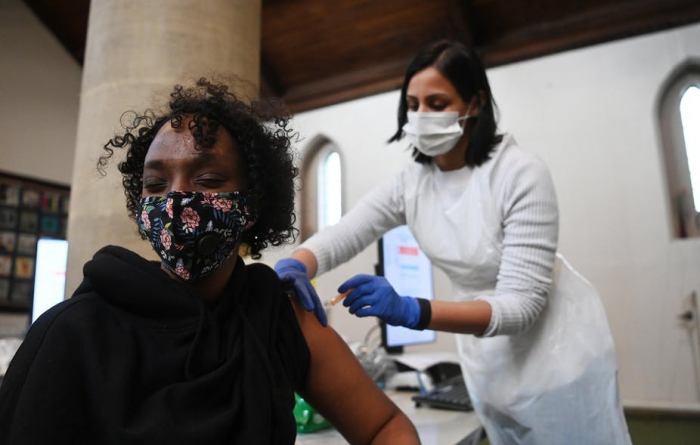Minority communities and developing-country populations may approach health services cautiously – and with good reason, given the medical profession's history of inhumanity. But, by blaming low COVID-19 vaccination rates on vaccine hesitancy, the profession is effectively using this history to victimize the same communities again.
When the United States began to roll out COVID-19 vaccines earlier this year, uptake in black communities lagged behind their white counterparts. Many assumed this was by choice: the history of medical abuses against them had supposedly left African-Americans mistrustful of the public-health intervention. A similar vaccine hesitancy has also purportedly hampered efforts to vaccinate African populations.
But this narrative amounts to little more than obfuscation.
To be sure, minority communities and developing-country populations may approach health services cautiously – and with good reason. From the gynecological experiments J. Marion Sims performed on enslaved black women in the 1800s to the four-decade-long Tuskegee Syphilis Study, in which infected black men were observed but not treated, there is no shortage of instances of medical abuse against African-Americans.
But, by blaming low COVID-19 vaccination rates on vaccine hesitancy, analysts and health-care providers are effectively using this history to victimize the same communities again. Decision-makers should not be permitted to evade responsibility for their failure to serve marginalized groups adequately by recalling the medical profession’s past inhumanity. Instead, these horrific episodes should highlight the deep-rooted systemic racism that pervades health care today – and spur action to address it.
Make no mistake: racism in health care is not a thing of the past. In the US and elsewhere, ethnic and racial minorities have faced substantially higher risks of becoming infected with the new coronavirus or dying from COVID-19. Non-Hispanic blacks comprise 12% of the US population, but 34% of coronavirus deaths (in cities and states that reported deaths by race and ethnicity).
This clearly is not a choice. Rather, it reflects the barriers ethnic and racial minority communities face in accessing medical care and treatment, as well as inequities in other areas that affect health outcomes, such as education, wealth, workplace conditions, and housing.
The same barriers and inequities that made ethnic and racial minority communities more vulnerable are undermining vaccine uptake. Chicago’s vaccine-rollout plan is a case in point. The city wanted to deliver doses through neighborhood pharmacies. But this would exclude the mostly non-white communities that live in “pharmacy deserts.” Those same communities are also less likely to have reliable internet access, making it difficult for them to register for a dose.
Similarly, claims that Africans are simply refusing to get vaccinated ignore the affronts against them by rich countries. In fact, most Africans have not had the luxury of choosing whether they want the vaccine, because rich countries have been hoarding doses.
Moreover, the vaccines Africans do have access to – largely those developed in China, Russia, and India – are often not approved in rich countries, and might be far less effective than, say, the mRNA vaccines produced by Pfizer and Moderna (which North Americans and Europeans have largely claimed). How can rich countries blame Africans for hesitating to accept vaccines they themselves have refused?
To add insult to injury, a handful of rich countries, led by the US, spent months blocking negotiations of an emergency waiver of World Trade Organization intellectual-property rules on COVID-19 treatments and vaccines, which would enable the rapid scaling up of production, in order to protect corporate interests. During the HIV/AIDS crisis of the 1990s and early 2000s, politics and profits similarly won out over the ethical imperative of ensuring affordable access to treatment, leading to hundreds of thousands of unnecessary deaths in the Global South, especially Africa.
US President Joe Biden’s administration recently reversed its position, and is now backing the waiver. But, again, precious time and countless lives have been lost. If populations whose lives are being relentlessly devalued lack trust in the system, is it their fault, or is it the fault of those who are shaping that system?
Non-white communities want the COVID-19 vaccine. In March, a Morning Consult poll found that racial gaps in vaccine willingness in the US were narrowing. As Georges Benjamin, Executive Director of the American Public Health Association, admitted in April: “We overstated the hesitancy issue,” and “understated the structural access issues.”
The same goes for African populations. Last December, a survey conducted by the Africa Centres for Disease Control and Prevention (Africa CDC), in partnership with the London School of Hygiene & Tropical Medicine, indicated that 79% of Africans would take a COVID-19 vaccine if it were deemed safe and effective.
Ensuring that these groups get the vaccine is a job for their leaders. That means both dismantling barriers to access and working to earn the public’s trust. The Africa CDC is setting an important example, meeting vulnerable communities where they are, listening to and acknowledging their expectations and anxieties, and nurturing greater engagement with the public-health system.
Privileged countries and communities will be tempted to continue to put their own needs first. They might even be tempted to continue to disregard the lives of vulnerable populations. But that temptation points to a pandemic without end.
Tian Johnson, Head of the African Alliance, is Civil Society Observer at the Robert Carr Fund, Co-Chair of the African CDC Vaccine Delivery Alliance’s Community Engagement pillar, founding member of the Vaccine Advocacy Resource Group, and an Aspen New Voices 2021 Fellow.
Stephaun E. Wallace, a staff scientist at Fred Hutch, is Director of External Relations at the HIV Vaccine Trials Network and COVID-19 Prevention Network and a Clinical Assistant Professor of Global Health at the University of Washington.
Maaza Seyoum is African Coordinator of the People’s Vaccine Alliance and Partnerships Lead of the African Alliance.
More about:
















































